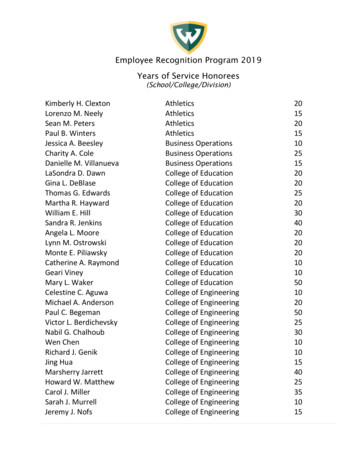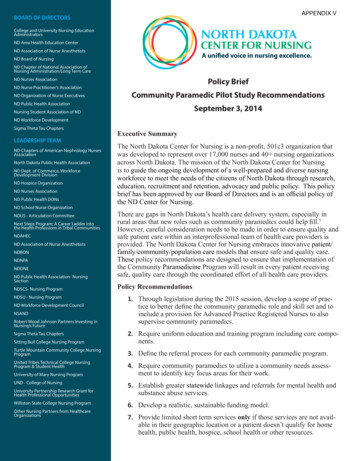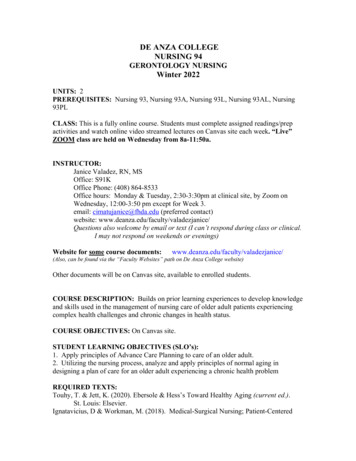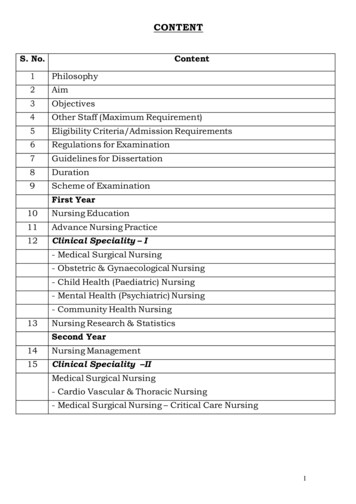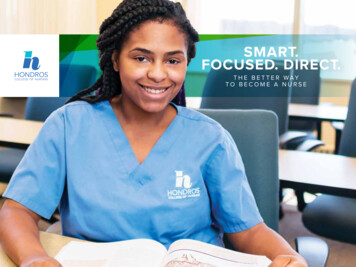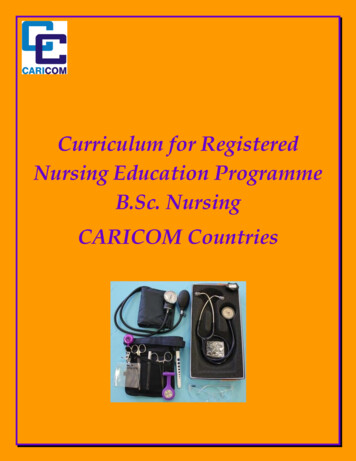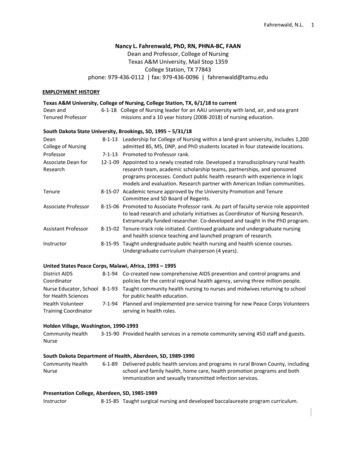
Transcription
College of Nursing
From the DeanIn this time of severe and growing shortage of nurses and nursing faculty, many believe the solution is to simply turn out morenurses faster, maintaining the nursing status quo. This dated approach does not foster the development of new educational programs,or the testing of new practice models. Rather, such innovations become viewed as “diversions.”The alumni and faculty of the UF College of Nursing believe we can never fix our broken health care systems or provide high quality nursing care for every patient by embracing the status quo. We view the current shortage as a tremendous opportunity to improvethe future of health care — a chance to better educate nurses and reform delivery models so that every professional nurse is utilized tothe full extent of her or his knowledge, skill and ability. For these reasons, we are pioneering the Clinical Nurse Leader and Doctor ofNursing Practice degree programs, and in partnership with clinical care leaders, are exploring new and better ways to shape health careso that interdisciplinary teamwork is fostered and patients are the central focus of our efforts. We are also preparing a new generationof nursing faculty who will educate and inspire professional nurses to be risk-takers and innovators, not satisfied with “good enough”nursing practice.The status quo has never been acceptable in our College of Nursing. Founding Dean Dorothy Smith challenged all who worked withher to change nursing for the better. The motto that guided our 50th anniversary celebration has never been more relevant. Every graduate is prepared to “care, lead, inspire”; every faculty member understands that teaching, research and practice must move nursing to anew place. As our alumni, friends and supporters, I urge you to join with us as we advance the profession on behalf of those we serve.Your encouragement, your gifts and your ideas are essential to move us to tomorrow.Sincerely,Kathleen Ann LongDean, College of Nursing
Florida Tomorrow and the College of NursingThe Promise of TomorrowThe University of Florida holds the promise of the future:Florida Tomorrow — a place, a belief, a day. Florida Tomorrow isCollege of NursingFlorida Tomorrow Campaign GoalsFaculty Support 7 millionStudent Support 4 millionPrograms and Research 3 millionfilled with possibilities. Florida Tomorrow is for dreamers anddoers, for optimists and pragmatists, for scholars and entrepreneurs, all of whom are nurtured at Florida’s flagship university:the University of Florida, the foundation of the Gator Nation.What is Florida Tomorrow? Here at the College of Nursing, webelieve it’s an opportunity, one filled with promise and hope. It’sthat belief that feeds the university’s capital campaign to raisemore than 1 billion.The Florida Tomorrow campaign will shape the university, certainly. But its ripple effect will also touch the state of Florida,the nation and the entire world. Florida Tomorrow is pioneeringresearch and spirited academic programs. It’s a fertile environment for inquiry, teaching and learning. It’s being at theforefront to address the challenges facing all of us, both todayand tomorrow.TOTAL 14 million
Donna Neff, principal investigator, nursepractice environments research study
Florida Tomorrow is a place where every patient has access to safe, high-quality health care.Solutions for Better CareAnyone who has seen a family member hospitalized —safety and quality care. The center, created in 2007 through a giftwhether as an emergency or for a routine procedure — wants tofrom Blue Cross Blue Shield of Florida, will develop strategiesbelieve his or her loved one will get the best possible care. Recentto improve health care access and outcomes for Floridians andstudies show that safe, high-quality care requires the right num-demonstrate how these can be applied nationally. In addition tober of well-educated nurses in supportive practice environments.collecting data on nurses’ work environments and their impactAt UF’s Blue Cross Blue Shield Center for Health Care Access,on patient care, Neff’s work will also identify the “best prac-a study of Florida’s hospitals will add to a growing body oftices” used by hospitals and other health care agencies to attractresearch findings linking nursing variables to patient outcomes.and retain nurses. Contributions of foreign-educated nurses willProfessor Donna Neff is leading the UF study and will surveyalso be considered. Neff hopes to gain insights related to care out-35,000 Florida nurses to develop a good understanding of howcomes for older patients, an area of particular interest in Florida.staffing and practice environments can affect patient care. One“Nurses are often given responsibility without the authority orgoal of the study is to provide insights to prevent nurse burnoutenvironmental supports necessary to effect good outcomes for theirand turnover, which contribute to high hospital costs and com-patients. Nurses must be included in the decision-making processpound the shortage.that determines hospital environments, and they must have the“We want to find out about nurses’ workplace environmentsand the burdens and stressors that detract from nurses’ effectiveness,” Neff says. “If we have an improved work environment,education necessary to fully participate in such decision-making,”Neff says.She will involve undergraduate and graduate students, asnurses can function better and will stay in their positions — that’swell as practicing nurses, in her research and in studying impli-good for patients.”cations of her research. Her ultimate goal is to lead in improvingNeff’s study is the first to be conducted under the auspices ofthe UF Blue Cross Blue Shield Center, which will focus on patientpatient care.
Florida Tomorrow is a day when well-educated nurses lead in the transformation of care.Higher CallingAfua Arhin and Ann Huesinger share a dream — to make a last-“The research opportunities I had at UF gave me a strongering impact on their profession by educating the next generation ofresume,” she says. “Without that, I don’t think I would be annurses. Although they came to teaching from very different back-associate dean just two years after graduation.”grounds, UF’s flexible doctoral-study options made it possible forboth to pursue that goal while juggling jobs and families.The College of Nursing’s effort to prepare high-achieving students for academic careers has established UF as a leader inHuesinger, who took classes in her hometown of Jacksonville,looked forward to combining her doctoral studies and years ofpractice experience to better educate tomorrow’s nurses.She’d worked in patient care for 25 years and initially wentaddressing the shortage of nursing faculty nationwide. While theback to school at UF’s College of Nursing to earn a bachelor’sshortage of direct care nurses often makes news, the faculty short-degree, but was encouraged to consider the college’s fast-trackage compounds the growing crisis. A survey by the AmericanB.S.N. to Ph.D. program.Association of Colleges of Nursing estimates that nursing schools“I saw myself as a mom and a nurse,” she says. “A doctoratein the United States turned away 42,866 qualified applicants inwas not something that was part of my reality. But the faculty at2006, largely due to lack of faculty.UF really thought I could do it.”Arhin was already teaching at Florida Agricultural &“There were places I wanted to go as a nurse that I couldn’t goMechanical University in Tallahassee when she went back towith the education I had,” Huesinger says. “To me, the best thingschool. She needed a doctorate to advance her career in nurs-about being a nurse has always been being able to teach, whethering education and enrolled in UF’s North Florida Ph.D. Nursingit was teaching new nurses or teaching patients. It’s really fulfill-Consortium to complete her degree without leaving her job.ing to be able to make a difference.”Partnering with state nursing programs at Florida A&M, FloridaDoctoral preparation from UF allows Huesinger and Arhin toState and the universities of North Florida and West Florida, theteach in the most meaningful ways: inspiring the next generationconsortium allows students to pursue UF doctoral degrees whileof excellent professional nurses.studying in Tallahassee, Jacksonville or Pensacola. Arhin graduated from UF through the consortium in 2005 and is now anassociate dean at Grambling State University in Louisiana.
Afua Arhin,associate dean,Grambling StateUniversity; UFPh.D. in nursingscience graduate
Charlotte Birkenfield (R), clinical nurse leaderstudent, and Lisa Maree, her preceptor, atthe Malcom Randall Veterans Hospital
Florida Tomorrow is a belief that new professional nursing roles will save lives.Patients’ LiaisonIn the increasingly complicated world of patient care, a typical hospital stay might include visits from several physicians anda team of nurses, along with input from specialists, nutrition-Nursing is one of the first schools to pilot the CNL program. Its firstclass, which included Brown and five others, graduated in 2007.The clinical nurse leader role requires a clear link between prac-ists, social workers, pharmacists and nursing administrators. Fortice and education. UF partners with Shands at UF, Shands AGH,patients, the bevy of faces and technologies can be bewildering.Shands Jacksonville, Malcom Randall VA Medical Center, WolfsonAmanda Brown, a graduate of UF’s Clinical Nurse Leader(CNL) graduate program, coordinates the array of resources toensure the best outcome for each patient.“Clinical nurse leaders were a missing piece in patient care,”Children’s Hospital and Baptist Medical Center in Jacksonville.“We were excited to be working with the University ofFlorida, especially on the CNL program,” says Carolyn Johnson,Wolfson’s chief nursing officer. “At the acute care hospital level,says Brown, who secured a job at Wolfson Children’s Hospital inwe found deficits existed — much of the master’s-level educationJacksonville before graduating. “There are so many technologieshad moved to specialized primary care NP roles, and that causedand services available to patients now, and the CNL will integrategraduates with master’s degrees to leave hospital-based prac-care from all of those resources.”tice. The CNL fills the gap for master’s-prepared generalist nursesClinical nurse leaders personalize and coordinate that care.“Every patient I care for as a CNL will see me every day. Theyand their families will know I am their point person in the mazeof hospital personnel,” Brown explains.The health care crisis gripping the nation involves a set of com-focused on direct care for hospitalized patients.”The program has been so favorable that at Wolfson, leadersenvision placing a clinical nurse leader on every surgical floor.“This is a role that was lacking before — leadership at the bedside by an expert nurse who will focus on the patient. It allowsplexities, and the nursing shortage is a key component. Evenhighly educated nurses to stay at the bedside and yet be leaders inso, a growing number of studies demonstrate that yesterday’sthe forefront of patient care,” says Jane Gannon, coordinator of theapproaches to delivering care won’t provide long-term solutions.Clinical Nurse Leader program. “What we’ve found, at least ini-To create a new kind of nursing professional — one trained totially, is this improves communication among the entire health carecoordinate, manage and evaluate patient care — UF’s College ofteam and dramatically improves patient care.”
Our Vision of TomorrowAs the flagship nursing school in Florida, the UF College ofstrategies to ensure that each nurse is utilized to the full extent ofNursing serves the health care needs of both the state and nation.his or her knowledge, skill and ability. Private dollars provide theWe consistently attract the finest students and faculty members,resources necessary to recruit and retain premiere faculty mem-and for over 50 years, have produced national leaders in healthbers needed to lead in these efforts.care practice, administration, policy and education. Providing aUF has the oldest and the best graduate nursing education pro-high-quality academic experience for the very best and brightestgrams in Florida, and we are thus well positioned to preparerequires private investments in faculty, students and equipmentthose who will serve as teachers and mentors for future genera-to continue our tradition of excellence.tions of nurses. Private gifts help us invest in our current faculty,Currently, the state of Florida suffers from a critical nursingrecruit and retain excellent new faculty members, and supportshortage that is expected to worsen due to an even more severegraduate students. Through these efforts the shortage of nursenursing faculty shortage, an expanding and aging population,educators will be lessened in the future and nursing educationand the ever-increasing complexity of care. UF is not only lead-capacity exponentially increased.ing the way in preparing new faculty and better-educated nursesResearch is a critical part of our overall goal: excellent healthto address this shortage, but we are examining the reasons for thecare for all. Nursing research focuses directly on improvingshortage and developing ways to lessen its impact in the future.clinical care for patients, helping families cope with illness, pre-Through research conducted by our faculty members we are eval-venting disease and disability, and devising ways to promoteuating the nurse’s role in the health care system and identifyingoptimal health. Private funding to expand our research is essen-
tial as it provides seed money for pilot studies that can then becomemajor, federally funded projects. Private funding allows the collegeto attract those investigators whose work will advance the safety andquality of care.We take great pride in the clinical expertise of our faculty members.Every day they exemplify the dedication to excellence in patient carethat we strive to develop in our students. Practice endeavors, such asour nurse-managed Archer Family Health Care clinic, set the standardfor cost-effective, high-quality care provided by faculty members andtheir students. Rural and underserved communities such as Archer,Fla., benefit significantly from our commitment to provide the bestpossible care regardless of an individual’s ability to pay. Private giftsenable us to develop and maintain ventures such as Archer FamilyHealth Care where students are introduced to the satisfaction thatcomes from working with families and communities to improve overall health.Your gift to the UF College of Nursing will make a significant difference well beyond our academic setting. Your resources enable usto prepare a better-educated nursing workforce for tomorrow, andthus ultimately improve health care for Floridians and for peopleacross the globe.UF is not only lead ing the way in preparing newfaculty and better-educated nurses to address thisshortage, but we are examining the reasons for theshortage and developing ways to lessen its impactin the future.
University of Florida College of Nursing Office of Development (352) 273-6614University of Florida Foundation, Inc. P.O. Box 14425 Gainesville, FL 32604 (352) 392-1691 www.FloridaTomorrow.ufl.edu
Partnering with state nursing programs at Florida A&M, Florida State and the universities of North Florida and West Florida, the consortium allows students to pursue UF doctoral degrees while studying in Tallahassee, Jacksonville or Pensacola. Arhin grad-uated from UF through the consortium in 2005 and is now an
